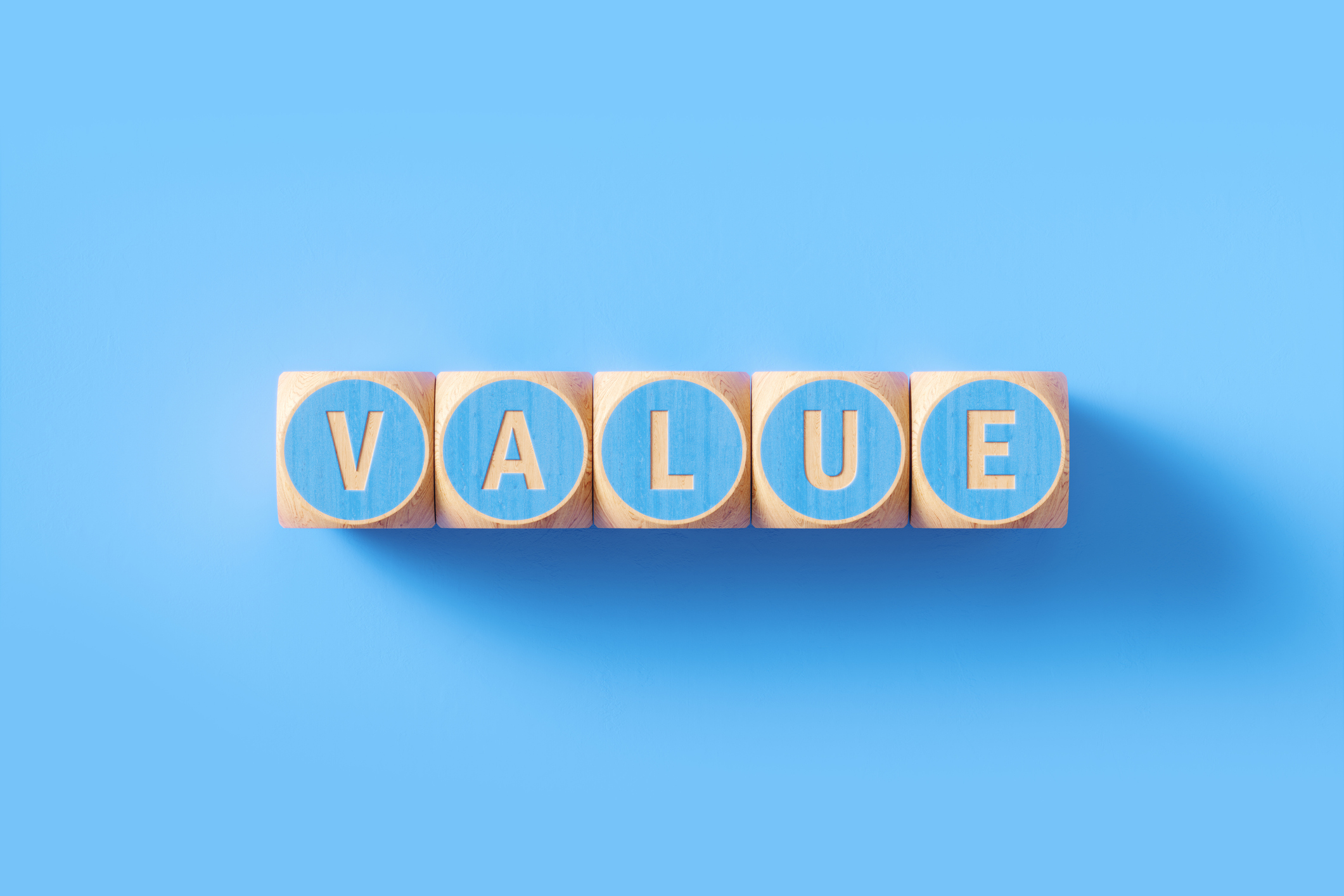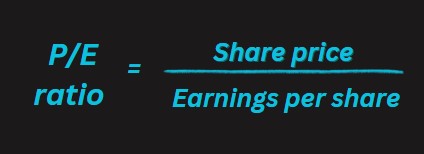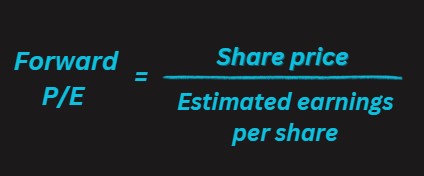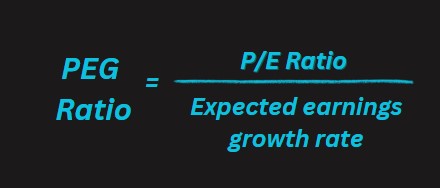The Best Value Stocks to Buy
Value stocks can be defined differently depending on who you ask. Here, we look at ways to measure valuation and how investors can find the best value stocks.

Profit and prosper with the best of Kiplinger's advice on investing, taxes, retirement, personal finance and much more. Delivered daily. Enter your email in the box and click Sign Me Up.
You are now subscribed
Your newsletter sign-up was successful
Want to add more newsletters?

Finding the best value stocks is similar to finding bargains at the grocery store or getting a sweet deal on the car.
However, with value stocks, the benefit of a discount isn't dollars in your pocket now – it's dollars in your pocket later, once the market realizes the stock's true value and drives the price higher.
That's how they're supposed to work, anyway.
From just $107.88 $24.99 for Kiplinger Personal Finance
Become a smarter, better informed investor. Subscribe from just $107.88 $24.99, plus get up to 4 Special Issues

Sign up for Kiplinger’s Free Newsletters
Profit and prosper with the best of expert advice on investing, taxes, retirement, personal finance and more - straight to your e-mail.
Profit and prosper with the best of expert advice - straight to your e-mail.
Today, we'll explore the concept of value investing, including how it's defined, why investors are drawn to it, ways in which stocks are valued, and how to find the best value stocks to buy.
Ticker | Company | Analysts' consensus recommendation | Forward P/E | PEG ratio | Dividend yield |
DELL | Dell Technologies | 1.80 | 10.0 | 0.671 | 1.8% |
CVS | CVS Health | 1.59 | 11.1 | 0.728 | 3.5 |
BAC | Bank of America | 1.62 | 12.7 | 0.99 | 2.0 |
CTRA | Coterra Energy | 1.70 | 14.9 | 0.63 | 2.9 |
CI | Cigna | 1.56 | 9.4 | 0.952 | 2.1 |
C | Citigroup | 1.74 | 11.3 | 0.509 | 2.1 |
FITB | Fifth Third Bancorp | 1.76 | 13.5 | 0.869 | 3.0 |
HBAN | Huntington Bancshares | 1.68 | 11.5 | 0.776 | 3.3 |
CFG | Citizens Financial Group | 1.52 | 13.0 | 0.539 | 2.8 |
SW | Smurfit Westrock | 1.33 | 17.0 | 0.516 | 4.2 |
MET | MetLife | 1.88 | 7.7 | 0.746 | 3.0 |
SYF | Synchrony Financial | 1.83 | 8.0 | 0.91 | 1.6 |
Ticker | Company | Analysts' consensus recommendation | Forward P/E | PEG ratio |
NCLH | Norwegian Cruise Line Holdings | 1.88 | 8.6 | 0.505 |
NRG | NRG Energy | 1.79 | 15.9 | 0.967 |
FSLR | First Solar | 1.78 | 10.7 | 0.34 |
ZBRA | Zebra Technologies | 1.78 | 14.0 | 0.708 |
WDAY | Workday | 1.77 | 15.6 | 0.552 |
NEM | Newmont | 1.71 | 12.0 | 0.204 |
NUE | Nucor | 1.67 | 15.4 | 0.877 |
CPAY | Corpay | 1.67 | 13.5 | 0.973 |
SNDK | Sandisk | 1.67 | 8.1 | 0.037 |
COF | Capital One Financial | 1.65 | 10.6 | 0.764 |
CRM | Salesforce | 1.64 | 15.0 | 0.89 |
MU | Micron Technology | 1.56 | 9.8 | 0.191 |
EQT | EQT | 1.56 | 14.3 | 0.714 |
KKR | KKR & Co. | 1.50 | 16.8 | 0.775 |
STLD | Steel Dynamics | 1.46 | 13.9 | 0.745 |
VST | Vistra | 1.43 | 13.6 | 0.605 |
UAL | United Airlines Holdings | 1.35 | 8.0 | 0.477 |
DAL | Delta Air Lines | 1.31 | 9.7 | 0.631 |
What are value stocks?
Value stocks are shares that trade for a lower price than what an investor thinks they should based on the company's underlying fundamentals.
And that's the only real simplicity you'll get with them.
That's largely because of the next natural question: How exactly do you measure a stock's value?
There's no single answer to this question, nor even just a few answers. Financial minds have wizarded up literally dozens of metrics that can be used to determine a stock's value, and thus determine whether a stock is under-, fairly or overly valued.
However, virtually all valuation metrics have some sort of blind spot, and some are really only useful in measuring certain categories of equities.
So it's typically best to use several metrics in concert when trying to identify value stocks.
Here are some of the most common valuation metrics:
Price-to-earnings (P/E):

The price-to-earnings ratio – often referred to as P/E ratio – is calculated by dividing a stock's price per share by a 12-month period of earnings per share.
Typically, when someone simply says "P/E," they're referring to "trailing P/E," which uses the trailing 12 months' worth (aka the past four quarters' worth) of earnings. P/E is a quick-and-easy way to produce a value for a company based on hard, reported data that every company provides.
But it has a few issues. For one, the market is forward-looking, so valuing a stock based on what it has already done vs what it will do isn't necessarily useful.
Also, it can't be used to value companies that are not currently profitable.
And like many valuation metrics, P/E isn't useful on its own – you'll typically want to compare it to a company's peers, its industry and/or a benchmark index like the S&P 500.
Forward P/E:

Forward P/E is similar to trailing P/E, except it uses earnings estimates for the E in the equation. On the one hand, you're dealing not with hard data, but merely analyst expectations.
On the other hand, instead of looking at what a company has already done, you're looking at what it might do in the future, which is more in line with where Wall Street's gaze is typically affixed.
Also, analyst expectations tend to be accurate enough to make forward P/E useful. Again, forward P/E on its own isn't too helpful; instead, you'll want to compare it to peers or the broader market.
Price/earnings-to-growth (PEG):

There is no perfect valuation metric, but PEG is one of the best. PEG takes a company's P/E (typically over the trailing 12 months), then divides that by its expected earnings growth rate, usually for the next five years.
The resulting number is evaluated through a system in which 1.0 is considered fairly valued, anything under 1.0 is considered undervalued and anything over 1.0 is considered overvalued.
PEG is a pretty useful metric because it factors in growth – based on, say, forward P/E, a utility stock might look much cheaper than a tech stock.
But once you also consider the expected growth you're buying, that utility stock might be expensive, and that tech stock might be a bargain.
You can use PEG on its own, but you can compare it to other PEGs. But like trailing and forward P/E, this doesn't work with companies that have no earnings.
Why do investors buy value stocks?
This question has a straightforward answer, at least.
Investors buy a value stock because they hope that, over time, other investors will begin to see the stock's intrinsic worth and buy up the stock, driving up the share price.
Also, like with any other classification of stock, investors also want the company's fundamentals to improve, further enticing investors to buy up shares.
We'll also note that, while it's hardly a rule, investing for value and investing for dividends frequently go hand in hand.
Growth stocks, which tend to be more expensive, frequently reinvest most if not all of their profits back into the business.
But slower-growth companies – the ones that tend to trade more in value territory – often use at least some of their cash to reward shareholders in the form of dividends.
How to find the best value stocks to buy
As mentioned above, there are a variety of metrics you can use to find under-loved stocks. As you become more familiar with these statistics, we urge you to incorporate them in your own research.
But if you're looking for the best value stocks to buy today, we've put together a basic quality screen to help you start your search:
To get to our lists of the best value stocks to buy, we looked for companies:
Within the S&P 500: To be clear: Value stocks exist in all shapes and sizes.
But to start with, we'll look for underappreciated names in the S&P 500, which is made up of predominantly large-cap stocks and a small contingent of mid-cap stocks.
With a forward P/E of less than 17.0: At the very least, we want to find the best stocks to buy that are cheaper than the market.
Currently, the S&P 500 is trading at 22.1 times forward earnings estimates, so we need stocks trading at a P/E of less than that.
With a PEG of less than 1: Where we'll really separate our stocks from the S&P 500 is PEG, which incorporates growth estimates.
The S&P 500 currently trades at a PEG of 1.18, which implies the broader market is overpriced.
Our screen will only include stocks with a PEG of 1 or less, which means they're not only quite a bit cheaper than the broader market, but also inexpensive by the technical definition of PEG.
With at least 10 covering analysts: We'd like to look at stocks that are on Wall Street analysts' radar, which makes it likelier that there's both more reporting and more insights on these companies.
The more stock research we have at our disposal, the more educated a decision we can make. Of course, because these are S&P 500 components, virtually all of them have a gaggle of analysts keeping tabs on them.
With a high-conviction consensus Buy rating: All of the stocks must have an average broker recommendation of 1.8 or less within S&P Global Market Intelligence's ratings scale.
S&P Global Market Intelligence converts analysts ratings into a numerical scale. Anything with a score of 2.5 or less is considered a Buy, while anything with a score of 1.5 or less is a Strong Buy – the highest designation.
By setting our bar at 1.9, we're ensuring all stocks included in the list are solidly in Buy territory at a bare minimum.
With a dividend yield of at least 1.5%: Again, because value investing and dividend investing often go hand in hand, we'll incorporate dividends into our screen.
We've set a yield bar of 1.6%, meaning all the stocks here offer at least a little bit more income than the S&P 500.
However, we recognize you might be dividend-agnostic.
So after the first group of stocks, you'll notice there's a second group of stocks produced by a screen that uses the same criteria above, but does not have a minimum yield (and in fact doesn't require the stocks to pay a dividend at all).
Related content
Profit and prosper with the best of Kiplinger's advice on investing, taxes, retirement, personal finance and much more. Delivered daily. Enter your email in the box and click Sign Me Up.
Kyle Woodley is the Editor-in-Chief of WealthUp, a site dedicated to improving the personal finances and financial literacy of people of all ages. He also writes the weekly The Weekend Tea newsletter, which covers both news and analysis about spending, saving, investing, the economy and more.
Kyle was previously the Senior Investing Editor for Kiplinger.com, and the Managing Editor for InvestorPlace.com before that. His work has appeared in several outlets, including Yahoo! Finance, MSN Money, Barchart, The Globe & Mail and the Nasdaq. He also has appeared as a guest on Fox Business Network and Money Radio, among other shows and podcasts, and he has been quoted in several outlets, including MarketWatch, Vice and Univision. He is a proud graduate of The Ohio State University, where he earned a BA in journalism.
You can check out his thoughts on the markets (and more) at @KyleWoodley.
-
 4 High-End Experiences Worth the Splurge After 50
4 High-End Experiences Worth the Splurge After 50These curated date ideas provide the perfect backdrop for couples ready to enjoy the very best that the world has to offer.
-
 Health Care Stocks Have Sagged. Can You Bet on a Recovery?
Health Care Stocks Have Sagged. Can You Bet on a Recovery?The flagging health care sector has perked up a bit lately. Is it time to invest?
-
 Costco's Auto Program: Can Membership Pricing Really Save You Money on a Car?
Costco's Auto Program: Can Membership Pricing Really Save You Money on a Car?Costco's Auto Program can simplify the car-buying process with prearranged pricing and member perks. Here's what to know before you use it.
-
 Health Care Stocks Have Sagged. Can You Bet on a Recovery?
Health Care Stocks Have Sagged. Can You Bet on a Recovery?The flagging health care sector has perked up a bit lately. Is it time to invest?
-
 Your Retirement Age Is Just a Number: Today's Retirement Goal Is 'Work Optional'
Your Retirement Age Is Just a Number: Today's Retirement Goal Is 'Work Optional'Becoming "work optional" is about control — of your time, your choices and your future. This seven-step guide from a financial planner can help you get there.
-
 Have You Fallen Into the High-Earning Trap? This Is How to Escape
Have You Fallen Into the High-Earning Trap? This Is How to EscapeHigh income is a gift, but it can pull you into higher spending, undisciplined investing and overreliance on future earnings. These actionable steps will help you escape the trap.
-
 I'm a Financial Adviser: These 3 Questions Can Help You Navigate a Noisy Year With Financial Clarity
I'm a Financial Adviser: These 3 Questions Can Help You Navigate a Noisy Year With Financial ClarityThe key is to resist focusing only on the markets. Instead, when making financial decisions, think about your values and what matters the most to you.
-
 Dow Absorbs Disruptions, Adds 370 Points: Stock Market Today
Dow Absorbs Disruptions, Adds 370 Points: Stock Market TodayInvestors, traders and speculators will hear from President Donald Trump tonight, and then they'll listen to Nvidia CEO Jensen Huang tomorrow.
-
 Private Capital Wants In on Your Retirement Account
Private Capital Wants In on Your Retirement AccountDoes offering private capital in 401(k)s represent an exciting new investment opportunity for "the little guy," or an opaque and expensive Wall Street product?
-
 It's Time to Bust These 3 Long-Term Care Myths (and Face Some Uncomfortable Truths)
It's Time to Bust These 3 Long-Term Care Myths (and Face Some Uncomfortable Truths)None of us wants to think we'll need long-term care when we get older, but the odds are roughly even that we will. Which is all the more reason to understand the realities of LTC and how to pay for it.
-
 Fix Your Mix: How to Derisk Your Portfolio Before Retirement
Fix Your Mix: How to Derisk Your Portfolio Before RetirementIn the run-up to retirement, your asset allocation needs to match your risk tolerance without eliminating potential for growth. Here's how to find the right mix.
